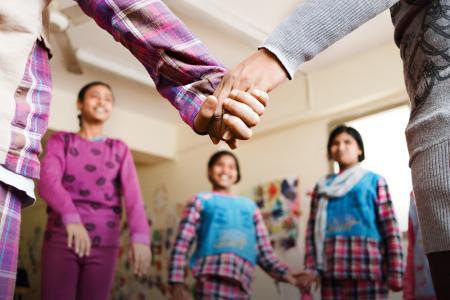
The Opening Doors for Europe’s Children – a pan-European campaign that advocates for strengthening families and ending institutional care – released 16 country fact sheets about the progress with the transition from institutional to family- and community-based care (also known as deinstitutionalisation) in 2018. The new generation of country snapshots covers 12 EU Member States, 2 EU pre-accession and 2 EU neighbouring countries.
Evidence reveals steady progress and growing commitment to the transformation of child welfare and child protection services in Europe. However, legislative and policy commitments and funding, including continued EU financial support, should be channeled more efficiently to close the gap between the closure of institutions and the development of a full range of prevention and alternative care options, as well as more individualised family and community-based support.
While steady progress towards the transition to family and community-based care is being made, much remains to be done. Based on the evidence presented in 2018 country fact sheets, the Opening Doors for Europe’s Children campaign recommends the following further actions that will help achieve the end of institutional care for children and ensure sustainability of reforms, effective use of funds and better outcomes for more children.
European Commission
- Support Member States to strengthen or develop national deinstitutionalisation strategies and action plans, in line with international human rights obligations including the UN Convention on the Rights of Persons with Disabilities (UNCRPD), ratified by the EU; the UN Convention on the Rights of the Child (UNCRC), ratified by all Member States, and the Guidelines for the Alternative Care of Children.
- Provide effective oversight of how EU funds are supporting the implementation of the ex-ante conditionality 9.1 (called enabling condition in 2021-2027 programming period) on the National strategic policy framework for social inclusion and poverty reduction, including measures for the shift from institutional to community-based care.
- Ensure that all EU funds including AMIF do not create parallel child protection systems for children on the move and are used in line with international human rights and humanitarian law and EU aquis.
- Ensure that the strengthening of child protection systems and the promotion of transition from institutional to family- and community-based care remain as investment priorities in all internal and external EU funding regulations in the 2021-2027 programming period.
- Ensure the effective application of the Partnership Principle and the European Code of Conduct throughout the design, implementation, monitoring and evaluation of the EU-funded programmes.
Member states
- Ensure that national deinstitutionalisation strategies and action plans are aligned with international human rights treaties including the UNCRPD, the UNCRC and the Guidelines for the Alternative Care of Children.
- Ensure that EU funds are used in line with the ex-ante conditionality 9.1 (called enabling condition in 2021-2027 programming period) on the National strategic policy framework for social inclusion and poverty reduction.
- Ensure that projects and newly developed services funded by the EU continue to be supported in the future through national funding and resources.
- In line with the Partnership Principle, ensure that civil society and service users have an active and meaningful role in decision-making regarding policies and the use of EU funds for child protection reforms.
- Channel EU funds and national budgets towards the strengthening of national child protection systems. Ensure that the strengthening of child protection systems and the promotion of transition from institutional to family- and community-based care remain as investment priorities in the 2021-2027 programming period.
- Address the implementation of deinstitutionalisation as a complex process and not simply as closing institutions through a comprehensive approach including preventive social work with families and children, the development and provision of a whole range of quality alternative care options and efficient services for children ageing out of care as well as inclusive education.
- Ensure that children in migration are not detained due to their legal status and have access to mainstream services and quality family- and community-based care as their peers.
Read more here.
Full list of latest Opening Doors country fact sheets is available here.
The 2018 fact sheets were produced by: FICE Austria, FICE Croatia, FICE Spain, La Port Ouverte in Belgium, Hope and Homes for Children in Bosnia and Herzegovina, Romania, and Ukraine, CCF/HHC in Moldova, National Network for Children in Bulgaria, in Estonia, Roots Research Center in Greece, Family Child Youth Association in Hungary, SOS Children’s Villages in Latvia and Lithuania, Child and Family Foundation in Poland and MODS in Serbia. They are updated by the National Coordinators of the Opening Doors campaign on an annual basis and are primarily sourced from the official state sources.










